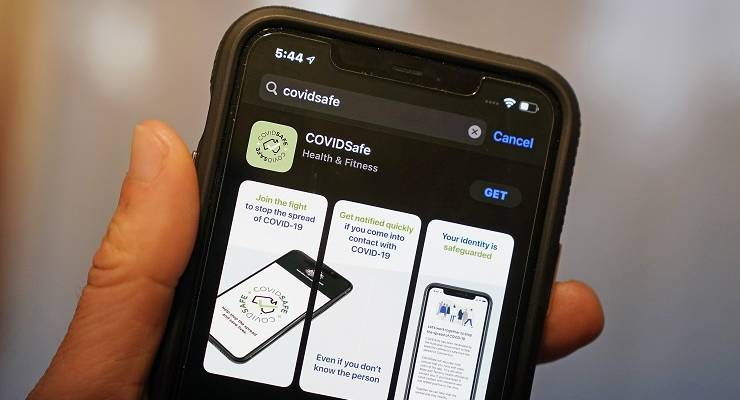
The government’s tracing app, COVIDSafe, is off to a flying start, with over 1 million downloads within hours of launch. But what if the rate of uptake slows to the extent that the government’s 40% adoption rate looks unlikely to be achieved. When then?
What about giving people incentives to download?
And can people be “nudged” along to adopt?
Taxes and subsidies
Incentivising app adoption can potentially come through traditional tools that economists use — tax breaks or taxes for app registration.
But behavioural economics can be used to amplify tax incentives. To make a tax break more powerful, the government could automatically give everyone a tax break irrespective of if they have downloaded the app.
Then, over time, the government could claw back the tax break if an individual doesn’t download and register with the app. Such a strategy would exploit the famous “endowment effect” in amplifying a tax break’s impact. Countless studies have demonstrated that people dislike giving something up even more than they like receiving it. Claw backs have indeed proven effective in amplifying incentive effects.
Alternatively, we might leverage people’s loss aversion by instituting a dedicated tax for not registering. As research suggests, people may be more motivated to avoid the loss of an additional tax, than to seek a refund on the tax they were already assessed.
Paying back the fines
The government could provide financial incentives using the tax revenue it generates from fining people up to $10,000 for breaking social distancing rules. For instance, signing up to the app means you are entered into a lottery pool with a chance to be paid $1000 out of the social distancing fine income.
This strategy would appeal to households’ preferences for lotteries and has been successful in other places, such as with Sweden’s Speed Camera Lottery.
Paying with mobility
Rather than using financial incentives, the government could instead consider an “app passport” whereby social distancing restrictions are further loosened for individuals who have downloaded and registered on the app.
The simulator
Recent research from Australia suggests app-usage is an “experience product” and that trialling such apps can lead to rapid “habit formation” and permanent adoption.
Leveraging these insights, the government could implement an “app simulator”, whereby before handling actual data, households’ are provided a weekly trial period to experience the app and learn about its safety benefits in dealing with COVID-19.
To provide a realistic experience, the simulator could provide a hypothetical situation to an individual of the information they would be provided if they were to come into close contact with COVID-19.
In this way, the government could help households allay any remaining privacy concerns and help people make an informed app adoption decision. People could delete the app after the trial period, or they could keep the app and start using it to protect themselves from COVID-19 once the trial ends.
Informational nudges
The government has already been using text messages and marketing campaigns to coordinate public action in dealing with COVID-19. This will be an important tool going forward for incentivising contact tracing app adoption through any of these interventions: for instance, texts about gradually clawed-backed tax breaks, mobility incentives from app adoption, or encouraging households to try the simulator.
Text-based nudges can make salient the public gains from mass adoption, thereby appealing to social norms and peer pressure in further encouraging app adoption. Texts could also make people aware of the extent to which others in their community, or neighbouring communities, have downloaded the app; research suggests that unfavourable social comparisons would motivate app adoption.
David P. Byrne is associate professor of Economics at the University of Melbourne. Richard Holden is professor of economics at UNSW Business School. Joshua B. Miller is associate professor of Economics at the University of Melbourne.








This is a dangerous line of thinking… it more likely the govt. will use punitive measures as they have done before. withhold Centrelink payments if the app is not downloaded and logged on the Centrelink recipients record of activity. The govt. have withheld money from parents for not having children vaccinated, and the Centrelink agents such as Jobactive networks are empowered (and frequently do) report ‘breaches’ of compliance, resulting in punitive measures such as being cut off from payments… and citizens have no real comeback to challenge those who make the marks against them.
Data is used against citizens in other ways, the taking of tax returns without warning to pay off alleged debts to Centrelink.
Data that was supposed to be available only to peak agencies and only in exceptional circumstances has been accessed by local councils to chase parking fines.
The best and most obvious is mentioned in the middle of the article – allow some relaxations of lockdown only for people using the app. EG meetings of more than two people only if you have the app and it is running. Later, bars and cinemas only if you use the app.
Simple and effective.
Are you serious? The app does not make it safer to relax social distancing rules. On the contrary it is a post facto measure to retrospectively trace possible routes of infection. This is precisely the kind of fatal misunderstanding that makes an app like this so dangerous. Incentivise uptake? 1. Embark on a massive public education campaign to prevent misunderstandings like this, along with other carrot and stick measures like this proposed in this article, which obviously fails to understand the word ‘voluntary’ . 2. Publicly acknowledge and apologise for previous violations of privacy by this government in order to convince me that something similar won’t happen again.
Of course it doesn’t make it safer. But if things go wrong contacts can retrospectively be tracked much more efficiently. It’s for use when infection rates are low. Have app – you may go to concerts (because on the rare occasion someone is sick we can track efficiently). Don’t have app, you may not go to concerts because on the rare occasion someone is sick we can’t work out who was involved.
Mostly though it would be simply the best and simplest carrot to encourage use.
‘Have app? You may go to concerts…’ And unwittingly infect people? No. The app potentially limits the damage in that those people can potentially be contacted so that potentially they don’t go and infect more people (which they have probably already done). App or no app: don’t go to concerts until there is universal testing. And I say this as a performer myself. The app is no more than a supplementary measure with little preventative effectiveness in comparison with testing. Look at Singapore.
It’s been proven by research ..that carrots n sticks work best with donkeys n rabbits…
The population is donkeys led by rats.
Say cheeeez for the CCTV.
I have the app and support its use, but restricting people’s privilege’s based on whether they have a government-mandated tracking app installed seems like the edge of a very dangerous web.
Why not simply pay people $10 a month (towards their phone bill if you like) to install the app. What’s that maybe two billion a year? Peanuts compared to the billions it costs to keep the economy shut-down.
I agree completely. The government has a lot of trust to win back it can start by repealing the appalling Assistance and Access Bill 2018 as well as the invasive and misused metadata act and by releasing the source code for the app. The rest is just a load of paternalistic claptrap from a mob who have given us every reason to mistrust it with our personal data.
I’d like to go to my holiday house in a covid 19 hotspot so I can paint the new deck. Some freeing up of movement is surely the best way to go.
Tax incentives may be useful but work against the basic tenets of the app, that it is a health and social distancing log, not an economic reward and punishment scheme. But if you’re a hammer, everything looks like a nail.
This is a horrifically deadly disease unknowingly spread by carriers who may be asymptomatic. Painting the new deck can wait.
Getting economists to comment on medical and technology subjects of importance to us all. What could possibly go wrong?
Lift your game, Crikey.
Last week,together with the Glow Research platform, I conducted a survey of 1000 Australians 18+ about possible adoption of the Government’s Trace Together Corona Virus App. We found that only 33.6% intend downloading.
This figure could rise to at least 67.1%, depending on successful promotion of its benefits.
The Government has indicated that a minimum of 40% adoption would make the App a success.
The bad news(depending on your perspectives about privacy) is that the App may not reach minimum penetration if it is simply made available. The good news is there’s every indication that they’ll easily reach their 40% and very probably much more, if they promote the community benefits of reduced deaths and faster consequent removal of restrictions.
There’s also a willingness to support health workers and reduce risks to them.
Respondents were told “The Federal Government is launching a mobile phone app to help trace and prevent Corona Virus. It will collect the phone number, name, age and postcode of a person you are physically close to for more than 15 minutes. This information is encrypted and stored only on your phone. It will only be uploaded to a central Government computer if you test positive to Corona Virus, so people you may have infected can be traced.”
33.6% initially said they would download it, 31.8% said maybe they would and 34.5% said they would not.
When those who did not intend to download the app were asked what would make them do so, five propositions were tested. The most effective of these messages was respondents being told that the more who download it, the more lives will be saved. This message alone lifted the percentage of likely downloaders to 55%, with 25.5% still saying no and 19.6% uncertain.
Assurances that the data would be destroyed within a week of the Corona Virus pandemic being declared over lifted intended download rates by 18%.
The notion of paying people $10 to download the app, or incentivising those who had it installed with a free $1million monthly lottery had a lower response.
After all messages were tested 32.9% of Australians were still reluctant to download the app.
While Government needs to work on building trust with those who are circumspect, the survey indicates that most Australians are more motivated by community goodwill than personal gain. If Government gets it right, they could reach 80% penetration.
Still a government flak I see.